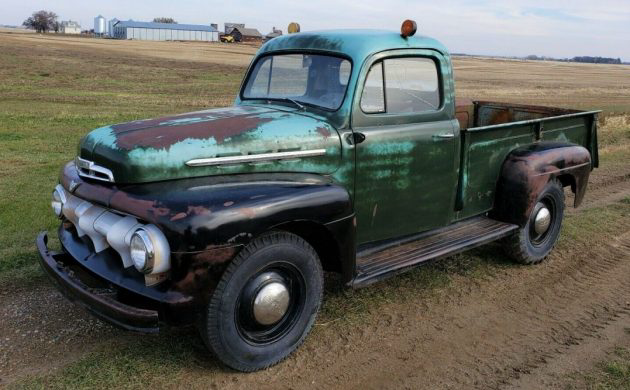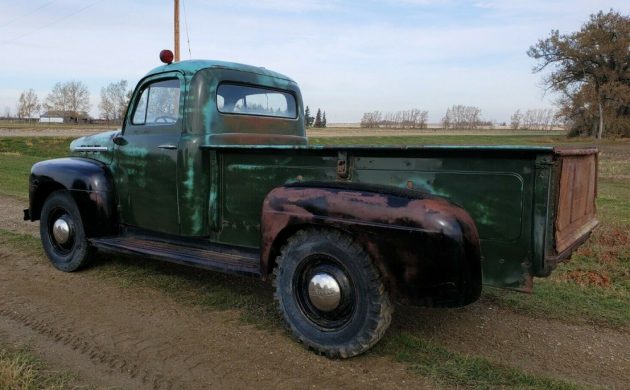No Reserve Project: 1951 Mercury M3 Pickup
Complete, original, and ripe for restoration. Those would have to be the best words that I can use to describe this 1951 Mercury M3 Pickup. It has led a relatively sheltered existence, meaning that it is also a pickup with only minor rust to address. If a fairly straightforward pickup project is something that is on your Bucket List, then you will find the Mercury located in Sweet Grass, Montana, and listed for sale here on eBay. It is being offered in a No Reserve auction, where bidding has reached $3,100.
The first thing that I noticed about the Mercury, even before reading the owner’s description, is how straight the vehicle is. Normally workhorses like this tend to accumulate a fair collection of dents and dings, especially over 68-years. The Mercury looks surprisingly straight, and even its rust issues are minimal. There are a few small spots in the bed-sides, but this is pretty normal. There are also a few spots in the fenders, but that looks to be about it. The cab corners, which can be quite prone, look nice and solid, while anything else on the vehicle would appear to be little more than surface corrosion. The timber in the bed is rotted, but to be honest, I probably would have been surprised if it had survived all of these years. I’ve also noticed that some of the glass is showing some signs of cloudiness, while the windshield sports some pretty sizeable cracks, and will need to be replaced. The owner makes an interesting claim about the Mercury, and this might explain its level of preservation. Apparently, the Mercury only saw service on a farm, and only during the warmer months. When the weather turned cold, it was tucked-up in a barn for the Winter. This seems quite plausible, especially when you look at its condition. As a consequence of this, the Mercury is also said to only have a genuine 30,000 miles on its odometer. If it has either rarely, or never, been off the farm, then this is certainly also conceivable.
The condition of the interior would tend to reinforce the claims made by the owner. The seat will require a new cover, while the wheel shows some pretty substantial cracks. That is the worst of the problems because the rest of it looks really good. The owner rightly points out that the radio blanking plate and the horn button are both present. These can either disappear or become damaged quite easily, so the fact that they are not only present but in good condition is a real bonus. If the next owner is interested in protecting the Mercury’s originality, then the interior is in the sort of condition that would allow this to happen with no major work required.
Under the hood of the M3 sits the original 239ci flathead V8 engine, producing 100hp. It is hooked to a 4-speed manual transmission with a floor shifter. The news here is both good and bad. The bad news is that the engine doesn’t run, and it isn’t clear when it last fired a shot. The good news is that it does turn freely, so it might even be able to be kicked back into life without the need for a rebuild. There are a few items that look to be missing, such as the air cleaner and engine fan, so replacements might need to be sourced for these items.
This Mercury M3 Pickup offers the next owner a world of possibilities, and it will be interesting to see which way our readers would go with it. It is such a solid and clean vehicle that it has enormous potential as a restoration project. Its overall appearance would also make it a strong candidate for a rat rod project. Another option would be to return the Pickup to sound mechanical condition, throw a blanket over the seat and some fresh timber into the bed, and then drive it as it is. Which way would you go?
Auctions Ending Soon
 2002 Subaru Impreza WRXBid Now2 days$333
2002 Subaru Impreza WRXBid Now2 days$333
 1975 Chevrolet Corvette ConvertibleBid Now2 days$4,000
1975 Chevrolet Corvette ConvertibleBid Now2 days$4,000
 1964 Ford F-100 Camper CustomBid Now2 days$2,000
1964 Ford F-100 Camper CustomBid Now2 days$2,000
 2006 Jeep Wrangler SportBid Now4 days$10,500
2006 Jeep Wrangler SportBid Now4 days$10,500
 1974 Datsun 260ZBid Now6 days$460
1974 Datsun 260ZBid Now6 days$460






Comments
Some farmer wanted to make sure every one knew which way he was fixing to turn hence the placement of the turn signals,safety first,style second.Engine condition sounds similar to mine when I started on our F-1,it spun freely but no compression what so ever.Removal of both heads revealed almost all valves stuck open,lots of lubrication and patience with a small hammer got em all moving again. Cooling and fuel systems overhauls got it purring like a kitten.Hopefully this one will be revived in similar fashion.Parts for a complete overhaul add up fast,my moto ,don’t fix it if it ain’t broke.
They just keep showing up. By the Korean War years the tonners out west were thinning out and the larger trucks were taking over on the farms. This one is a very well preserved example that would be worth having. Somewhere around this time Ford phased out the tried and true T-9 crashbox and started using the T-98 with synchros. Interesting enough they still whined behind a flathead V8 albeit not quite as mournfully as the T-9. A 239? In a Mercury? Unless someone swapped it in, the engine under that hood should be a 255. Mercury used a Mercury powerplant. A guy who worked for the Mercury dealership just north of the border did say that he thought a 239 might have been a delete option in the Mercury, just like body-colored fenders or a standard cab. Mercury trucks had an edge over their Ford counterparts. And for KS, high-perched signal lights were fairly commonplace in our region. Most mounted them on the fenders but there were obviously some who went for the ‘Mickey Mouse’ look…
How many of these RARE trucks are out there and how the hell does this one guy keep finding them all?! And they all basically look the same condition wise. It’s borderline eerie, but I’m glad he’s bringing them out of the barns or whatever mystical place he’s pulling them out of, and back into circulation.
Incredible survivor! I’ve never seen one cleaner than this one. And it’s a Merc! Killer truck.
Clear coat over “patina” on a non-running truck. Not my thing.
There is a great YouTube site called Coldwar motors by a guy in Alberta who keeps dragging old cars home and reviving them. He can rebuild or repair pretty much any part and his budget for each car is almost zero. His daily driver is a restored Frasier that he dragged out of the Bush.
There’s a guy (Mark) who frequently comments on this page (we’ve also swapped a few E-mails) who turned me onto that site. I’ve watched a few of them and have been well entertained. I’ve been amazed at what they do to make some of those clunkers go. I’m also amazed at how little goes into resurrecting something that appears hopeless…
I think “Stewardship” is the order of the day for this lovely beast. Get it running, and drive it, as is.
Its those Canuck farm truck guys again.
Great deals.
This one is a steal
My over all favorite year!! The grill does it for me!!! Looks mean and aggressive!! I’d restore it completely original with new paint and drive the snot out of it!!
One really great looking old truck!
It does look like the tailgate has been replaced though. There is no Mercury stamped into it.
Find it a bit strange that you don’t emphasize that Mercury Trucks were never sold new in the USA – Canada only making the Mercury nameplate a much a rare beast in the US..!
Yes, Mercury trucks were primarily built and marketed in Canada, with the exceptions being the Super Duty and Cab-Overs. Growing up on the border, I saw lots of Mercury trucks come south when I was a kid. The closest dealer of any kind was 10 miles north into Canada and a lot of the farmers ignored the red tape of importing and bought up there anyways. It might have helped that the Mercury dealer, himself, was from Kansas. I might add that during the Korean War, there was somewhat of a shortage or materials in the United States, while Canada, even though it was also involved in the Korean campaign, didn’t restrict nearly as much.